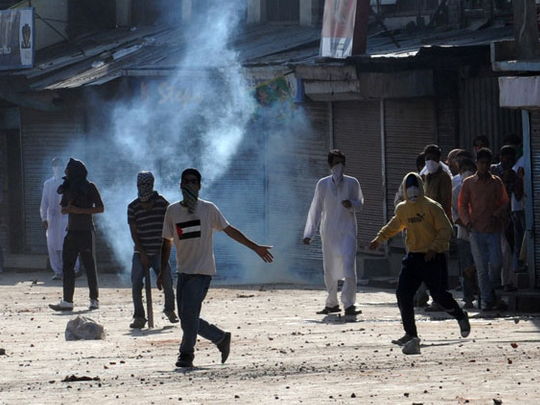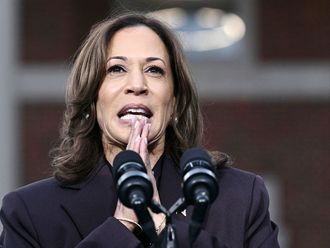
I had interaction with some Kashmiri young men in New Delhi this week. There was no doubting their indignation and exasperation. The killings in the valley, more than 80 since the beginning of stone pelting in June, were very much on my mind and I wanted to know what could be done.
"Why don't you leave us," one said. Another was more specific: "We want Azadi. What is the population of the valley? Please include Muslim areas in Jammu and Ladakh." This would come to about a little over 10 million.
One said: "It is not the question of numbers but that of feeling. We just do not want to be part of India." Another added: "We want to make clear that we do not want to be part of Pakistan either."
I vainly argued with them that a country with a population of 10 million would be hardpressed to sustain itself without any help from India or Pakistan. "There is the entire Muslim world to help us," they said.
This is what bothers me, I told them. The religion which you have brought to your protests shows clearly that you want to establish another Muslim state on India's border. What will be its repercussions in India which is trying its best to float above the turbulent waters of communalism and stay secular? All that they said in reply was: "We want Azadi."
I have not visited Kashmir for more than six months. But from what I see on television, it looks as if the whole valley has come on to the streets with angry young men leading the mobs. They may be instigated, but it is a determined lot. It would be foolhardy not to take into account their anguish, particularly of those who have lost their dear ones in police firing.
Special powers
The government, particularly Chief Minister Omar Abdullah, believes that the anger will be assuaged if the Armed Forces Special Power Act (AFSPA), which gives extraordinary powers to the security forces in a disturbed area, is amended suitably or abolished. The problem has been politicised and New Delhi has known it all along. But the more it is delayed the more tangled will be the problem.
Prime Minister Manmohan Singh's remark — there was need to address issues of trust deficit and government performance — cannot remedy the situation. By shifting the responsibility of its follies to the ruling National Conference, which with all its limitations has stood by New Delhi from day one. The centre is only proving that it has gone from one mistake to another, without realising that it would have to pay for them some day.
Every time the economic package or creation of youth employment is considered a panacea for all troubles. The challenge from the days of Shaikh Abdullah to Omar Abdullah is how does New Delhi give Srinagar a sense of identity, without letting Kashmir to translate that status into independence? It has been a difficult task and it is going to be so when the constitution says that Kashmir is part of India.
That there is no alternative to talks goes without saying. But New Delhi has to separate fundamentalists from those who want to rule democratically and in a pluralistic way. Ultimately, it depends on what New Delhi is willing to offer in terms of political power.
Singh is willing to go to any lengths within the constitution. Good enough if there is a solution within the constitution. But if it is not possible, it should not matter if the terms of agreement go beyond the constitution.
Politicising the issue
In any case, Article 374 gives Kashmir a special status in the constitution. New Delhi should be ready to give back whatever subjects it may have taken beyond Defence, Foreign Affairs and Communications, the three subjects which Srinagar gave New Delhi when the state acceded to the Union.
The BJP has politicised the issue. Already Narendra Modi of the Gujarat carnage fame has started attacking the Centre for not being "tough in Kashmir". The world knows what his toughness means.
Some argue that panacea of such problems is to concede the right of self-determination. Today's world does not recognise any group of people or area which raises the standard of separation. Were the principle of self-determination to be applied in South East Asia, many states in the region would face the prospect of disintegration.
New Delhi's mistake is that it has left the Kashmir problem hanging fire for such a long period. It proves the charge that many elements have come to develop a vested interest in the status quo. Singh is quite right when he says that he was willing to talk to any party or group so long as it does not project or support violence.
Once New Delhi and Srinagar have come to terms, they should talk to Islamabad. Even otherwise, all the three can sit across the table. The participation of Pakistan is necessary because all the agreements, beginning from the one at Tashkent to the Shimla, mention Pakistan as one of the important parties. More over, not long ago, India and Pakistan had come to clinch the issue, if former prime minister Atal Bihari Vajpayee and former Pakistan foreign minister Khursheed Mahmoud Kasuri are to be believed.
Kuldip Nayar is a former Indian High Commissioner to the United Kingdom and a former Rajya Sabha member.









